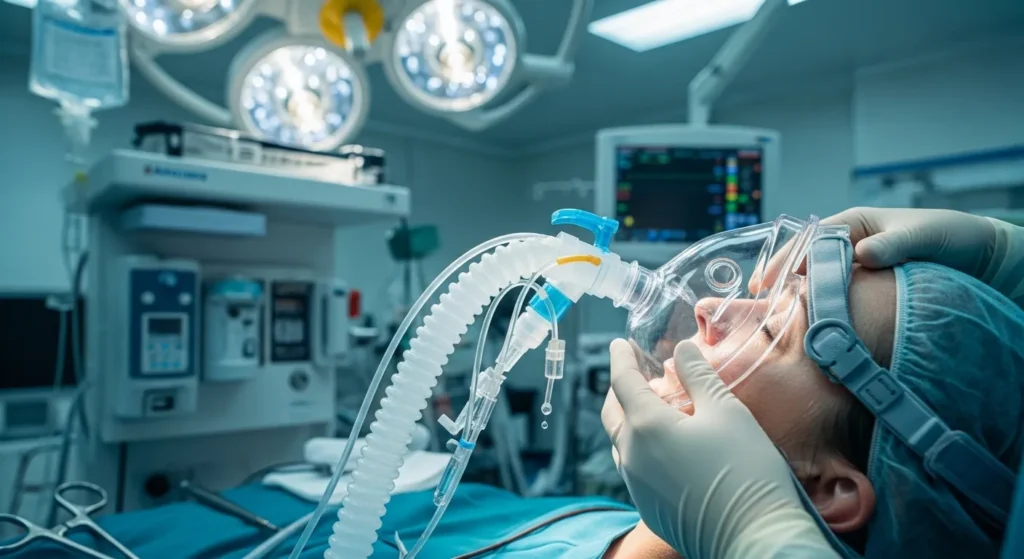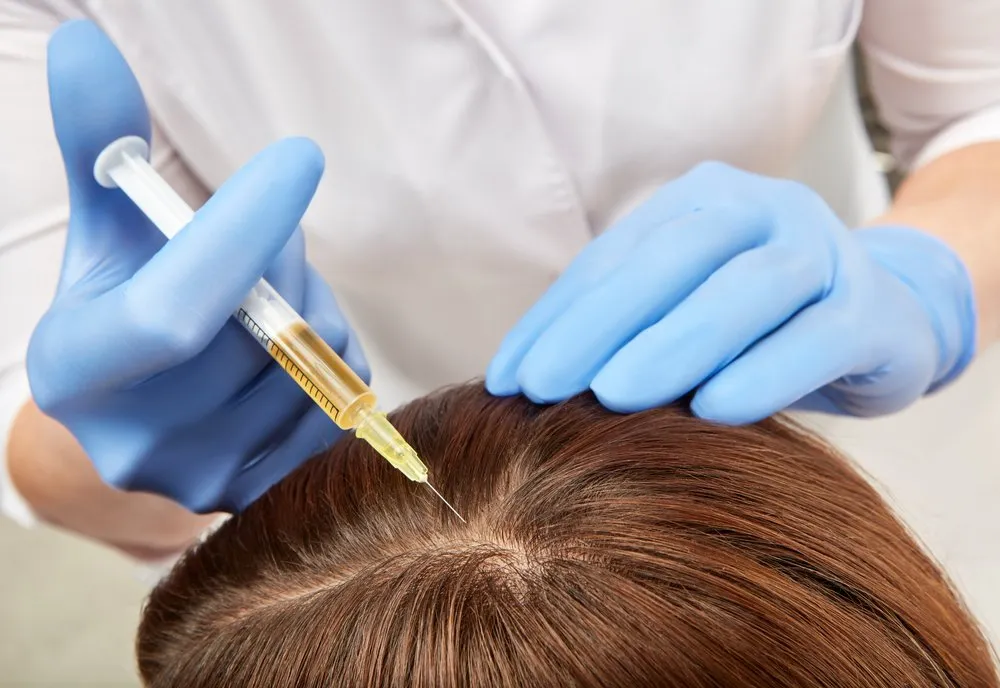Did you notice unusual hair shedding weeks after surgery and wonder, “Will hair loss from anesthesia grow back?” You’re not alone. Post-anesthesia hair loss, often triggered by stress and a condition called telogen effluvium, is typically temporary.
In this article, we’ll explain why it happens, how long it lasts, and what you can do to support healthy hair regrowth. You’ll learn practical recovery tips, get expert-backed insights, and discover when to consult a hair specialist.
What Causes Hair Loss After Anesthesia?

Understanding Telogen Effluvium
One of the most common causes of hair loss after surgery is a condition called telogen effluvium. It occurs when physical or emotional stress pushes a large number of hair follicles into the “resting” phase (telogen), resulting in noticeable hair shedding about 6–12 weeks later.
This condition is non-scarring and temporary, which means your hair follicles are not permanently damaged; they’re simply paused in the growth cycle.
How Surgery and Stress Trigger Hair Shedding
Surgery is a major physical stressor. Combined with general anesthesia, blood loss, pain, or medication side effects, the body can react by redirecting resources away from non-essential functions like hair growth.
Key contributors include:
- General anesthesia
- Emotional stress or anxiety
- Post-operative inflammation
- Drastic changes in diet or metabolism
- Blood loss or low iron levels
Types of Anesthesia Linked to Hair Loss
While both local and general anesthesia have been associated with post-operative hair shedding, general anesthesia is more commonly linked due to its systemic effects. However, it’s important to understand that anesthesia doesn’t directly “kill” hair follicles; it influences the hair cycle through stress and metabolic disruption.
Is Anesthesia-Related Hair Loss Permanent?
Timeline of Temporary Hair Loss (Telogen Phase)
In most cases, hair loss due to anesthesia is temporary and part of a self-correcting cycle. When the body returns to equilibrium, the follicles re-enter the growth phase (anagen), and new hairs begin to grow.
Hair loss usually starts:
- 6–12 weeks after surgery
- Peaks around 3–4 months
- Begins recovery by 6 months
Signs That Hair Loss Is Reversible
Look for these positive signs:
- Gradual reduction in hair fall
- Soft, fine baby hairs (vellus hair) growing near the hairline or crown
- No signs of scarring, itching, or inflammation
When to Worry About Permanent Damage
Hair loss might be more serious if:
- Shedding persists beyond 6–9 months
- You experience patchy bald spots or scarring alopecia
- There is a family history of genetic hair loss (androgenetic alopecia)
If in doubt, consult a dermatologist or hair specialist for a trichoscopy exam.
How Long Does It Take for Hair to Grow Back After Anesthesia?
Average Hair Regrowth Timeline (3–6 months)
Hair affected by telogen effluvium typically starts regrowing within 3–6 months after the triggering event (e.g., surgery). Full thickness may take up to 9–12 months, depending on:
- Age
- Hormonal balance
- Nutrition
- Overall health
Factors That Affect Regrowth Speed
Several factors influence your recovery:
- Iron or zinc deficiency
- Thyroid hormone levels
- Stress management
- Post-operative nutrition
Recovery Chart: Month-by-Month Hair Progress
| Time After Surgery | What to Expect |
|---|---|
| 0–2 weeks | No visible hair loss yet |
| 6–12 weeks | Sudden hair shedding begins |
| 3–4 months | Peak hair fall, visible thinning |
| 4–6 months | New growth starts (vellus hair) |
| 6–12 months | Gradual thickening and recovery |
How to Speed Up Recovery from Post-Anesthesia Hair Loss
Nutrition and Supplements
Nutritional deficiencies can delay hair recovery. Consider:
- Biotin: Supports keratin structure
- Iron: Prevents deficiency-related shedding
- Zinc: Essential for follicle regeneration
- Vitamin D: Regulates hair cycle
Pro Tip: Always consult your doctor before starting supplements.
Gentle Hair Care Tips During Recovery
Avoid harsh products and practices:
- Use sulfate-free, mild shampoos
- Skip tight hairstyles or chemical treatments
- Pat your hair dry, avoid vigorous rubbing
- Use wide-tooth combs to reduce breakage
Medical Treatments (Minoxidil, PRP Therapy)
If natural recovery is slow, dermatologists may recommend:
- Minoxidil (topical or oral): Boosts blood flow and extends the growth phase
- PRP (Platelet-Rich Plasma) therapy: Stimulates follicles using your growth factors

When to See a Dermatologist or Hair Specialist
Consult a professional if:
- Hair loss continues beyond 6 months
- You suspect underlying conditions like thyroid or autoimmune disorders
- You’re concerned about pattern hair loss or permanent thinning
Can You Prevent Hair Loss After Surgery or Anesthesia?
Managing Stress and Inflammation
Mental stress and inflammation are major triggers. Support your body by:
- Practicing relaxation techniques (e.g., deep breathing, yoga)
- Managing pain effectively post-op
- Getting enough sleep
Pre-Op and Post-Op Hair Health Tips
- Eat a balanced diet with protein, iron, and vitamins
- Stay hydrated before and after surgery
- Avoid crash dieting or fasting post-op
- Follow up with your healthcare team for lab tests (iron, thyroid, vitamin D)
Protective Medications or Supplements
Speak to your surgeon or hair specialist about:
- Take iron supplements before surgery if levels are borderline
- Multivitamins to bridge nutritional gaps
- Hair-supportive protocols after surgery
ABHRS Guidelines on Surgery-Induced Telogen Effluvium
The American Board of Hair Restoration Surgery (ABHRS) confirms that stress-induced hair loss is typically temporary and does not require aggressive treatment unless prolonged.
Emotional Impact and Recovery Journey
Hair loss after surgery can be emotionally distressing. Support groups, reassurance from healthcare providers, and tracking your progress can reduce anxiety and build confidence in recovery.
When to Consult a Hair Loss Specialist
Red Flags That Require Medical Attention
- Hair loss persisting over 6–9 months
- Signs of inflammation, burning, or pain
- Sudden patchy bald spots
Role of Trichologists and ABHRS-Certified Surgeons
A trichologist can evaluate scalp health, while an ABHRS-certified specialist like Dr. Rana Irfan can assess treatment options such as PRP or transplant if needed.

Frequently Asked Questions (FAQs)
How do I know if anesthesia caused my hair loss?
If hair shedding starts 6–12 weeks after surgery and occurs diffusely (not patchy), it may be due to telogen effluvium caused by anesthesia or surgical stress.
Will my hair grow back thicker or thinner?
Hair typically grows back to its original thickness. In some cases, initial regrowth may look fine or wispy before thickening over time.
Does every surgery lead to hair loss?
Not always. Telogen effluvium is more likely with major surgeries, long anesthesia exposure, or significant post-op stress.
Can general anesthesia cause bald spots?
No. It usually causes diffuse thinning, not bald patches. Bald spots may suggest a different condition, such as alopecia areata.
Take Your Next Step
Early support makes all the difference in recovering from hair loss. Whether it’s post-surgery shedding or general hair thinning, our clinic offers expert evaluations and customized treatment plans.
Book a consultation with Dr. Rana Irfan in Islamabad today to get clarity on your hair health and kickstart your recovery.
